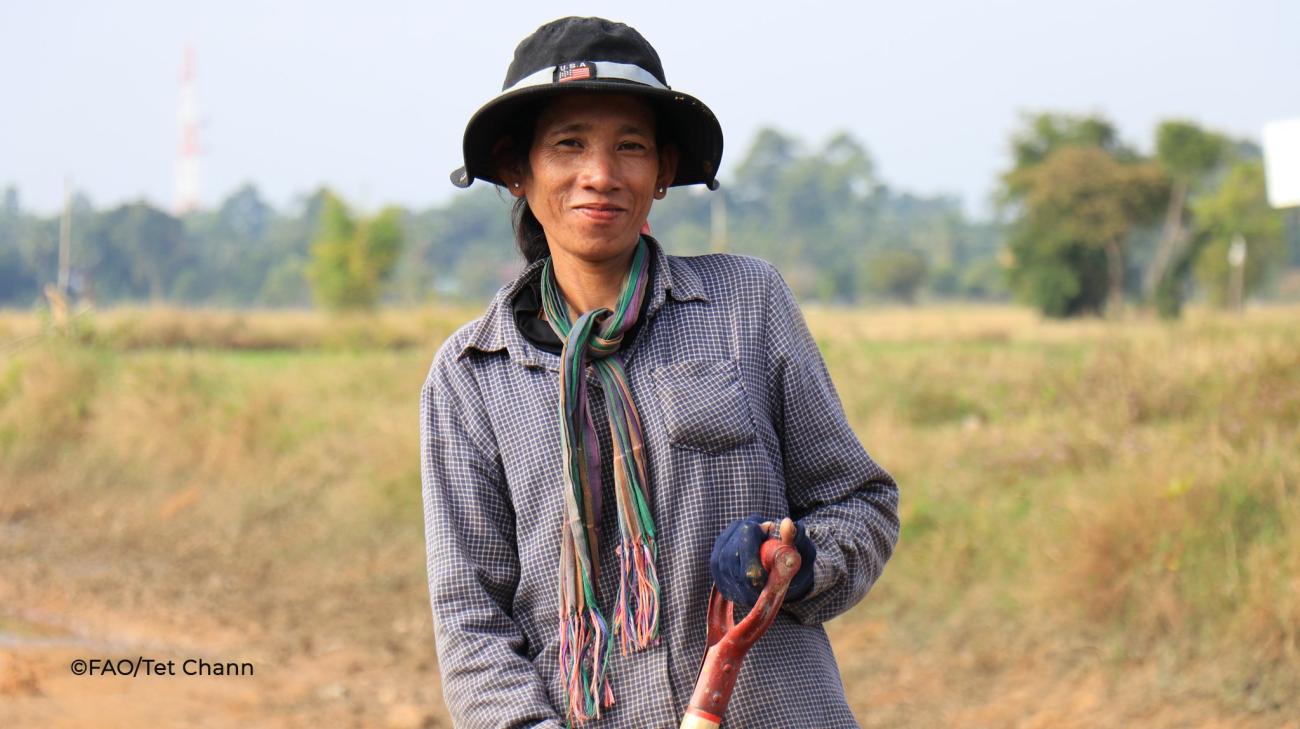Cash-for-work assistance helping families with the most basic needs amid the pandemic

Written by FAO Cambodia
The COVID-19 pandemic is leaving millions of Cambodian rural populations in need of extra supports to meet their immediate needs for survival. The movement restriction resulted from national measures to contain further spread of the virus has saved lives and protected the entire health care system in Cambodia from collapse, but severely affected economic activities, particularly the most vulnerable households. The loss of job and income, while the price of some important food products and services has increased, adversely disrupts ability of most vulnerable households to meet their basic needs such as food, water, medicines, leading to an increase of food insecurity.
“I need to spend less and reduce daily intake, as I do not have any income. Before the COVID-19, my family spent at least USD 4 a day for food and for my children to spend on some snacks at school. But, for now, I spend less than USD 2.5 or USD 2.5 at most for food,” said Sok San, a construction worker and father of three children living in Domrey Chhlorng village, Khna Po Commune, Sotr Nikum district, Siem Reap Province.
He continued, “a few months in the raining season, maybe starting from June or July, we start to run out of rice from our stock.”
From the same village, Yoeum Khorn, a 42-year-old mother of seven children, who is a woman-headed household, makes a living and feeds all of her children through a seasonal casual job in the community she lives. She lost her income when she could not go to work at the cassava field, which is located very far from her village.
“I normally go to work at the cassava field with other villagers. We go there via a vehicle, which belongs to another villager. But with the travel restriction and little accident happened to the vehicle’s owner, there is no other mean for transportation, so I have to stay in the village.”
As she owns not even a small piece of land for rice farming, Khorn’s family receives 30 Kg of rice per month through a charity.
With funding support from the Swiss Agency for Development and Cooperation (SDC), the Food and Agriculture Organization of the United Nations and the Ministry of Agriculture, Forestry and Fisheries (MAFF), has joined hands with local partners to implement a 20-month project to directly support the most affected families by the COVID-19 crisis, including the poor and vulnerable households, small-scale farmers, returning migrant workers and unemployed casual workers in provinces of Siem Reap and Banteay Meanchey.
To mitigate the economic effects of the ongoing CVID-19 pandemic, the project provides short-term and temporary employment opportunities to the poorest and food-insecure households through activities under cash-for-work scheme, including rehabilitation of irrigation, allowing families involved to receive some amount that can help them to pay for food and medicine and save for education of their children.
San and Khorn has received around USD 150 each from their works in rehabilitating an irrigation and construction of three intake structures at Ou Romdeng’s irrigation scheme in Sotr Nikum district supported by the project.
“I used the money I got from this [cash-for-work] activity to buy some kilograms of rice, spend on some medicines for my wife, and buy new study bag for one of my children as it was already so ragged, and a few books,” said Sok San.
Khorn said that, “I decided to buy a dining table, save some amount to cover the study of five of my children who are still enrolling in school, and I am so content that I am now able to pay for zinc to complete the remaining space of my home’s wall.”
As IDPoor households, San and Khorn have also benefited from the Cambodian’s government cash transfer programme for the poor and vulnerable households during the pandemic, where they have received around USD 50 monthly to ease their economic impacts of the pandemic. They reported to use this amount to clear some debts and the rest is to cover their basic needs. As of 24 October 2021, the national cash transfer programme benefits 678 459 households, with a total transfer of USD 470 million. This programme will continue until September 2022.
Although San and Khorn do not have any rice plots, they are so happy with the project supports to rehabilitate the Ou Rumdeng irrigation scheme, as they can earn income to meet their immediate needs while at the same time, contribute to social work for the benefits of their community. Ou Rumdeng irrigation scheme was identified by local authorities and communities as a priority for rehabilitation. The project supported rehabilitation of a tertiary canal of 570 meters long and construction of three intake structures through cash-for-work. In addition, a secondary canal of 1 300 meters in length is being rehabilitated through machinery. Mr Sea Seat, Damrey Chhlorng village chief, claimed that the rehabilitation of the Ou Rumdeng irrigation scheme will provide longer-term benefits. It will greatly support agricultural production and fishing for family consumption. The common areas covered by this irrigation scheme is about 91.3 ha covering four villages of Khna Po commune, benefiting about 682 households (3,149 people, 50% women). Farmers whose paddy fields are located along the canal will have a better access to water and able to double rice crop a year as well as growing other subsidiary crops
The project supports approximately 500 households like San and Khorn in both target provinces with cash-for-work assistance, which activities are extended to helping forestry communities to promote Assisted Natural Regeneration of forests (ANR), a simple, low-cost restoration method that can enhance productivity and ecosystem functions of degraded lands, before the project ends in July 2022.






